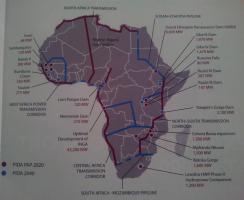African leaders come together this week for action on modernizing weather and climate services, which inextricably link the Continent’s development, climate, and resilience agendas.
Weather and climate drive nine out of ten disasters in Africa, threatening Africa’s hard-won development gains. Floods, droughts, tropical cyclones, and landslides continue to cause heavy damage and losses to livelihoods. Over the last two decades, these disasters have cost the continent US$10 billion dollars. Given the increasing climate variability, these disasters are projected to increase in frequency and intensity.
“Effective hydromet services, such as advanced weather and climate forecasting or simple – and sustainable – river level gauges, ensure that communities have the early warnings needed to prepare before disasters hit. Climate services permit government agencies to effectively plan for climate change based on the latest information, and businesses in climate-sensitive sectors to incorporate timely, accurate data in the decisions that affect their industry.” – Petteri Taalas, Secretary-General, World Meteorological Organization
Today, the World Bank, WMO, African Development Bank, UNDP, AFD and WFP launched the first AMCOMET Africa Hydromet Forum at the Africa Union Commission headquarters in Addis Ababa, Ethiopia. The Forum, a first of its kind, brings together 500 delegates including African leaders from governments, public and private sectors, civil society, and development partners who agree that improved weather, water, and climate services, known collectively as hydromet, can ease disaster-related losses and boost their economies.
Co-hosted by the African Union Commission and the Federal Democratic Republic of Ethiopia, it unites Africa leaders who wish to emphasize that weather and climate-related disasters are reversing development gains across the entire continent. These disasters can reduce the Gross Domestic Product (GDP) of a country by 10 – 20 percent, not only derailing economic development, but reversing economic gains. Improving hydromet services is integral to building resilience to natural disasters across Sub-Saharan Africa.
The Forum will provide a platform to position hydromet strengthening as a pillar of Africa’s climate-resilient development and adaptation planning. It will demonstrate the benefits of doing so across a range of sectors including agriculture, water, transport, civil aviation, natural resource management, environment, energy, and disaster risk management. Delegates at the Forum will draw on best practices and lessons from the implementation of existing strategies plus propose concrete actions to address the weather, water, and climate challenges facing Africa.
Present at the Forum, the African Union Commission, World Bank, the Global Facility for Disaster Reduction and Recovery, World Meteorological Organization, and key partners are leading additional efforts for the modernization of hydromet services. These efforts focus on institutional capacity building, systems modernization, and service delivery. In the Democratic Republic of Congo for example, strengthened hydromet and climate services are benefitting nearly three million people through a jointly led program. This Forum will be an annual event and is expected to lead to even more partnerships.
The four-day African Ministerial Conference on Meteorology (AMCOMET) Africa Hydromet Forum, which is openned today in Addis Ababa, will run through September 15, 2017.

